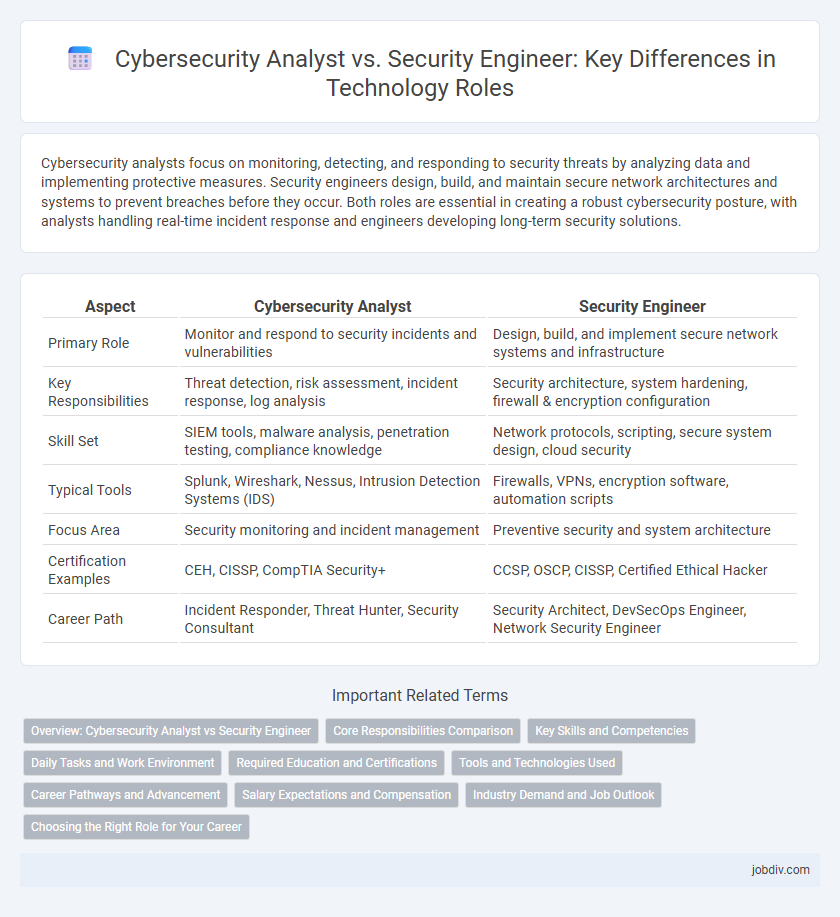Cybersecurity analysts focus on monitoring, detecting, and responding to security threats by analyzing data and implementing protective measures. Security engineers design, build, and maintain secure network architectures and systems to prevent breaches before they occur. Both roles are essential in creating a robust cybersecurity posture, with analysts handling real-time incident response and engineers developing long-term security solutions.
Table of Comparison
| Aspect | Cybersecurity Analyst | Security Engineer |
|---|---|---|
| Primary Role | Monitor and respond to security incidents and vulnerabilities | Design, build, and implement secure network systems and infrastructure |
| Key Responsibilities | Threat detection, risk assessment, incident response, log analysis | Security architecture, system hardening, firewall & encryption configuration |
| Skill Set | SIEM tools, malware analysis, penetration testing, compliance knowledge | Network protocols, scripting, secure system design, cloud security |
| Typical Tools | Splunk, Wireshark, Nessus, Intrusion Detection Systems (IDS) | Firewalls, VPNs, encryption software, automation scripts |
| Focus Area | Security monitoring and incident management | Preventive security and system architecture |
| Certification Examples | CEH, CISSP, CompTIA Security+ | CCSP, OSCP, CISSP, Certified Ethical Hacker |
| Career Path | Incident Responder, Threat Hunter, Security Consultant | Security Architect, DevSecOps Engineer, Network Security Engineer |
Overview: Cybersecurity Analyst vs Security Engineer
Cybersecurity analysts primarily focus on monitoring, detecting, and responding to security threats by analyzing network traffic and investigating security incidents. Security engineers design, implement, and maintain security systems and infrastructure to prevent cyber attacks and ensure robust protection. Both roles are critical in safeguarding organizational data but differ in their operational emphasis on threat detection versus system architecture.
Core Responsibilities Comparison
Cybersecurity analysts focus on monitoring network activity, detecting vulnerabilities, and responding to security incidents through real-time analysis and threat assessment. Security engineers design, implement, and maintain secure network architectures, develop security protocols, and integrate cybersecurity solutions to prevent breaches. Both roles collaborate to protect organizational assets but differ in their emphasis on reactive analysis versus proactive infrastructure development.
Key Skills and Competencies
Cybersecurity Analysts excel in threat detection, vulnerability assessment, and incident response, utilizing skills in risk management, security monitoring, and forensic analysis. Security Engineers specialize in designing, implementing, and maintaining robust security architectures, demonstrating expertise in network security, encryption techniques, and system hardening. Both roles require proficiency in intrusion detection systems, firewalls, and compliance regulations, with Analysts focusing on monitoring and response while Engineers emphasize prevention and infrastructure security.
Daily Tasks and Work Environment
Cybersecurity analysts monitor network traffic, analyze security breaches, and implement protective measures to safeguard organizational data, often working in fast-paced, reactive environments such as Security Operations Centers (SOCs). Security engineers design, develop, and maintain security systems to prevent cyber threats, typically engaging in proactive tasks like configuring firewalls and intrusion detection systems within collaborative, project-driven teams. Both roles require constant vigilance and adaptation to evolving cyber threats but differ in their focus on incident response for analysts versus infrastructure development for engineers.
Required Education and Certifications
Cybersecurity Analysts typically require a bachelor's degree in computer science, information technology, or cybersecurity, coupled with certifications such as CompTIA Security+, Certified Information Systems Security Professional (CISSP), or Certified Ethical Hacker (CEH). Security Engineers often hold a similar educational background but benefit from advanced certifications like Cisco Certified Network Professional Security (CCNP Security), Certified Information Security Manager (CISM), or Offensive Security Certified Professional (OSCP) to demonstrate deeper technical expertise. Both roles emphasize continuous learning to keep pace with evolving cybersecurity threats and technologies.
Tools and Technologies Used
Cybersecurity Analysts primarily utilize SIEM (Security Information and Event Management) tools like Splunk, QRadar, and LogRhythm to monitor and analyze security incidents in real-time. Security Engineers focus on deploying and managing advanced security technologies such as firewalls, IDS/IPS, endpoint protection, and encryption protocols, often working with platforms like Palo Alto Networks, Cisco ASA, and Fortinet. Both roles require strong proficiency in scripting languages such as Python and PowerShell for automation and custom tool development.
Career Pathways and Advancement
Cybersecurity Analysts typically begin their careers conducting threat assessments and monitoring security systems, gaining foundational expertise in incident response and vulnerability management. Security Engineers advance by designing and implementing robust security architectures, requiring deeper technical skills in system hardening and cryptographic protocols. Career progression for Analysts often leads to Security Engineer roles or specialized domains like penetration testing, while Engineers may move into leadership positions or strategic roles such as Security Architect or Chief Information Security Officer (CISO).
Salary Expectations and Compensation
Cybersecurity Analysts typically earn an average salary ranging from $75,000 to $105,000 annually, focusing on monitoring and responding to security incidents, which appeals to companies emphasizing threat detection. Security Engineers command higher compensation, with salaries often between $90,000 and $130,000 per year, reflecting their role in designing and implementing robust security systems. Compensation packages for both roles may include bonuses, stock options, and benefits, but Security Engineers generally receive greater financial incentives due to their technical expertise and strategic impact on cybersecurity infrastructure.
Industry Demand and Job Outlook
Cybersecurity Analysts and Security Engineers both face strong industry demand driven by the escalating frequency of cyberattacks and regulatory compliance requirements. According to the U.S. Bureau of Labor Statistics, employment for information security analysts is projected to grow 35% from 2021 to 2031, outpacing average job growth rates, while Security Engineers are increasingly sought after for their specialized skills in threat mitigation and infrastructure protection. Organizations prioritize these roles to safeguard sensitive data, with Security Engineers often commanding higher salaries due to their technical expertise in system architecture and vulnerability management.
Choosing the Right Role for Your Career
Cybersecurity analysts focus on monitoring, detecting, and responding to security threats, making them essential for real-time defense and incident management. Security engineers design, build, and implement robust security architectures and systems to prevent breaches before they occur. Choosing between these roles depends on whether you prefer proactive infrastructure development or reactive threat analysis within the cybersecurity field.
Cybersecurity Analyst vs Security Engineer Infographic

 jobdiv.com
jobdiv.com